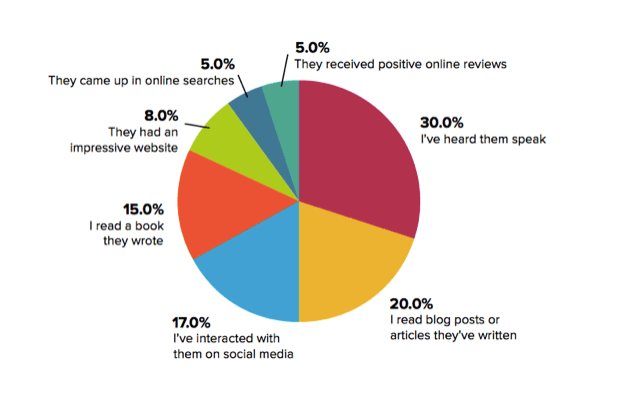Professional services firms have long relied on referral marketing to demonstrate their value and get connected to prospective clients.
But if you rely on your current clients for word-of-mouth referrals based on your work quality and responsive service, you are missing bigger opportunities.
In our recent study, Referral Marketing for Professional Services Firms, 82 percent of the 523 professional services firms we questioned acknowledged they have received a referral from someone who was not a client.
What’s more, if you assume a client referral will always get you in the door, consider this: More than half of respondents reported they have ruled out referrals before they ever speak with the professional services firm in question.
Diversify Your Referrals Strategy
In today’s environment of the self-service buyer’s journey, information is ubiquitous.
Websites, Google searches, social media, books, webinars, and blogs are the primary sources of knowledge and insight about a prospective firm’s expertise.
And potential referrers are avid consumers of these resources. If content is king, then buyers and referrers are dictators.
According to Forrester research, for every traditional marketing or sales piece a firm produces, B2B buyers will find three alternative resources about a firm.
It stands to reason, therefore, to go where the referrers are.
Professional services firms can best increase their visibility, build their brand, and strengthen their reputation by sharing content, demonstrating thought leadership, and clarifying their sales message through these same channels.
Referral Opportunities Abound
We asked our survey respondents to explain how they learned about firms they have referred.
While the responses were fairly evenly divided between expertise-based (referrals from those aware that you specialize in certain industries or a certain type of service but often lack any real knowledge of your reputation) and reputation-based referrals (referrals that come from people who have not directly worked with you but may know someone who has worked with you or heard about your firm’s general reputation), it was the traditional experience-based referrals (referrals that come from people who have direct experience working with your firm) that came in as a distant third.
Keep in mind that traditional experience-based referrals is what professional services have traditionally relied on for growth.
- Expertise-based Referrals (48% of referrals): Demonstrate the depth and breadth of your expertise. You may receive a referral because your particular expertise is a strong match for someone else’s specific problem or need.
- Reputation-based Referrals (46% of referrals): “A good reputation is more valuable than money,” wrote the ancient Syrian author Publilius Syrus. Today, your reputation may earn referrals from individuals and organizations that have never worked with you but have heard others refer to you favorably.
- Experience-based Referrals (6% of referrals): While good word-of-mouth is invaluable, you can’t sit back and wait for a spontaneous client referral. In our earlier research, we learned that, while the majority of clients are willing to recommend their service providers, 72 percent said they were never asked to make a referral.
 Build Referrals through Visibility, Brand, and Reputation
Build Referrals through Visibility, Brand, and Reputation
Referrals are essential. But despite more than half of clients reporting that their professional services firms never asked them to make a referral, there’s another reason not to build your referral marketing strategy exclusively on client experience.
Buyers are doing their own research.
Your future clients are reading reviews and listening to the digital grapevine to shape their opinion of your professional reputation.
They are also taking cues from the many available channels—online and offline—to develop their own sense of your expertise and how well it matches their needs.
Those 52 percent of respondents who told us they ruled out referrals without ever speaking with a firm gave us a clearer idea of what is turning them off:
- Lack Clarity: Forty-four percent couldn’t understand a provider’s services, expertise, or capabilities or how a provider could meet their needs.
- Not Helpful: Thirty-three percent felt a provider was more focused on sales than in helping their firm.
- Unimpressive Website: Thirty percent were turned off by the content and/or design of a provider’s website.
- Poor Content: Twenty-four percent were not inspired by the content they read.
- No Reputation: Eighteen percent simply had never heard of the service provider before.
Referral marketing is important to your firm’s business; 62 percent of professional services firms we questioned said “generating more referrals was their top marketing initiative in 2015.”
But you can’t sit back and rely on client referrals to create your opportunities. You need to make your presence known in the marketplace.
Increased visibility, the credibility of your expertise, and a stellar reputation are the killer combination that will build your brand.
So, demonstrate your knowledge.
Make your website and content speak for you.
And win over your future clients with your willingness to share your expertise and desire to help.
